Impact of the COVID-19 Pandemic on the Careers of Young Researchers
The COVID-19 pandemic has disrupted the daily working routines of researchers across the globe. Researchers at an early career stage – when mobility, networking, and specialization are essential – may be particularly vulnerable to the measures taken against the spread of the disease. How have the first months of the pandemic affected their work and how do they assess the consequences to their future careers?
Within the scope of the Career Tracker Cohorts (CTC) study, funded by the Swiss National Science Foundation SNSF, we surveyed researchers at the postdoctoral level in fall 2020. In total, 765 individuals took part in the surveys, all of which had applied to a postdoc mobility grant of the SNSF in 2018, 2019, or 2020. The sample includes researchers from all disciplines and from research sites across the globe. It is no surprise that nearly all survey participants reported that measures to combat COVID-19 were adopted in spring 2020 where they were living. We were interested in learning more about potential changes in their work routines, effects on their research, and their own assessment of the impact the pandemic would have on their careers. The following results mainly refer to spring 2020, while the surveys took place in fall 2020.
Work from Home Across Continents
The survey participants were asked how often they worked from home before COVID-19 measures were put in place, during spring 2020, as well as at the time of the survey. Before measures against the spread of the coronavirus were enacted, researchers had rarely worked from home. In spring 2020, when more or less strict measures were adopted (depending on where respondents were living), the majority of the respondents worked from home. This applies to Europe and Northern America (see Figure 1). In October 2020, people worked from home a bit less frequently than in spring on average. Concerning the regions, the picture is a bit more diverse: In Switzerland, the researchers returned to their offices more often than, on average, those from the rest of Europe and from Northern America.
Figure 1: Work from home
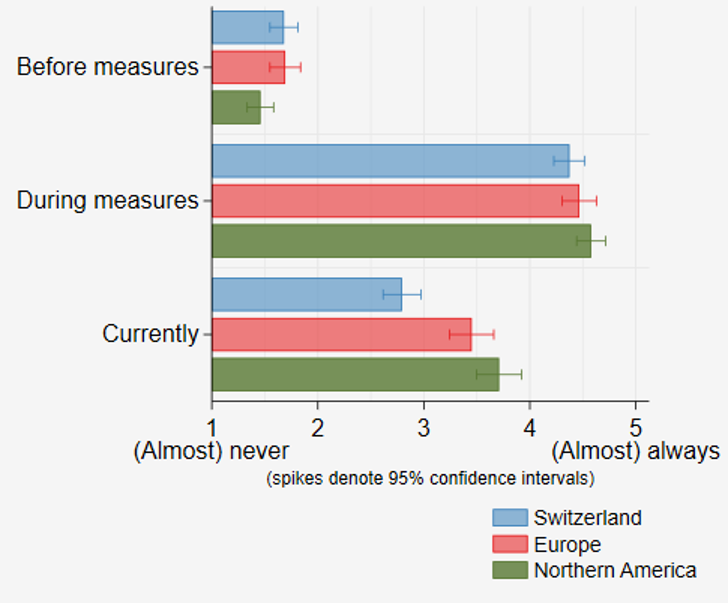
People with Children Worked Less and at Different Times
The survey participants further reported whether their actual work time changed in spring 2020, when measures against COVID-19 were put in place, compared to the time before the pandemic. On average, the amount of time spent working did not change much. However, while participants who do not have children worked about the same as usual, participants with children worked less than usual (see Figure 2).
Figure 2: Change of actual work time
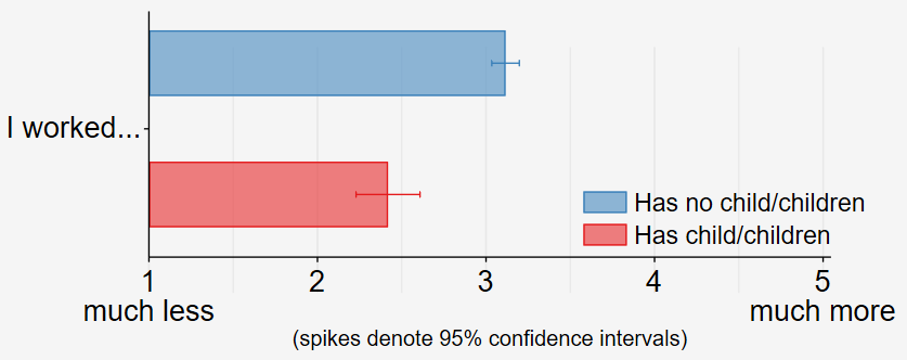
In addition to the amount of time people spent working, we also asked about potential changes in the participants’ work schedules (multiple answers were possible). In fact, roughly half of the participants reported that they worked more often in the early morning and/or in the late evening. Moreover, a third of them indicated that they worked more often on the weekends and/or during the holidays. Furthermore, a correlation between shifting the work schedule and being a parent can be observed. Actually, more than sixty percent of the participants with children reported shifts to mornings and/or evenings, but only half of the participants without children. Similarly, parents shifted their work time to weekends and/or holidays a little more often than people without children (see Figure 3).
Figure 3: Change of work schedule
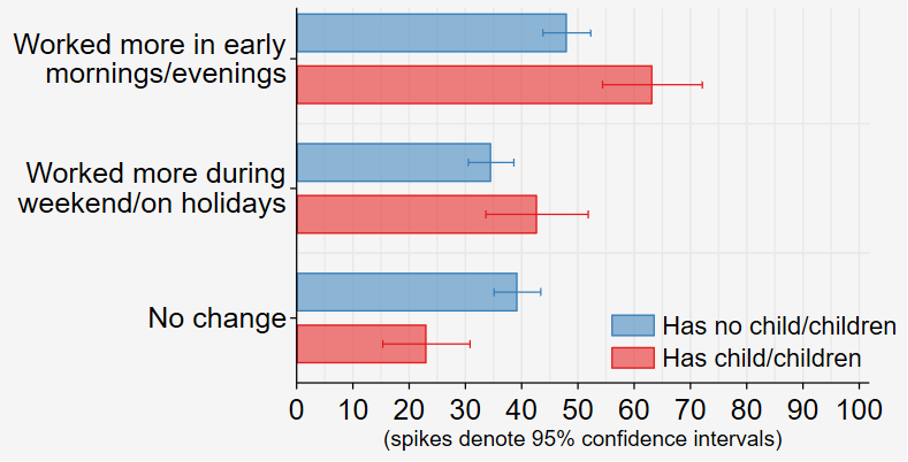
Decreased Work Productivity
When asked about changes in their work productivity, both male and female respondents indicated that their productivity was somewhat limited in the spring, when the measures were put in place. Our multivariate model shows that changes in self-estimated work productivity were clearly related to changes in work time. People who had to take extra time off due to care responsibilities experienced a decrease in work productivity, whereas an increase in work time resulted in a significant increase in productivity. Furthermore, working from home was related to a slight decrease in self-reported productivity. Concerning the regions, we find that researchers based in Switzerland report higher productivity on average compared to researchers abroad. This could be due to better conditions for working from home in terms of infrastructure for instance, or the finding could be an artifact, since the majority of the researchers based in Switzerland belong to the most recent cohort. Those researchers were in the process of preparing their funding application at the beginning of the pandemic, and were therefore in a different situation than those who are part of earlier cohorts. Part of them had received funding from the SNSF and had a running mobility grant abroad at that time (see Figure 4).
Figure 4: Change in work productivity
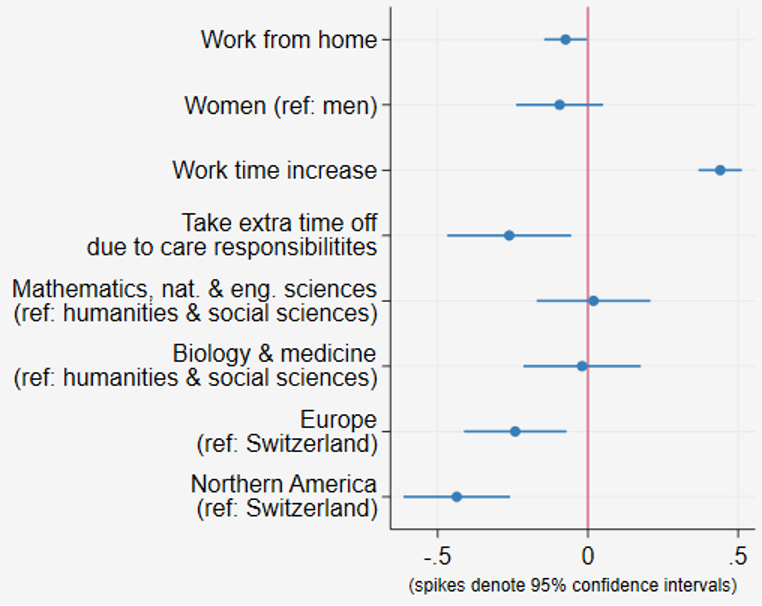
Negative Career Outlook
Overall, the surveyed researchers expected the COVID-19 measures to have a rather negative effect on their future careers. This is at least partly due to the fact that they experienced various restrictions in their research activities, particularly also with regard to mobility. Many indicated that conferences and research visits were postponed or canceled. Furthermore, research was delayed or interrupted, and labs were closed. People who reported that conferences were canceled, who published less than planned, whose lab was closed, and people who missed project application deadlines rated the negative effect on their career higher than those who were less affected by these restrictions. In addition, researchers based in Northern America are more worried about their future careers than their colleagues in Europe (including Switzerland). Finally, participants working in Biology or Medicine as well as those who started doing research on COVID-19 (in any discipline) rate their future career prospects slightly less negative than the rest of the participants (see Figure 5).
Figure 5: Impact of restricted research activities on future career
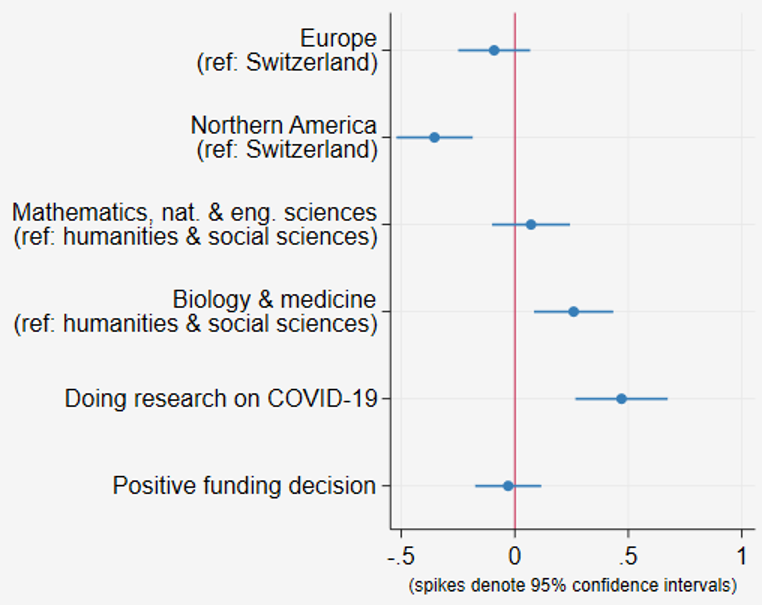
Impact of the Pandemic
The COVID-19 pandemic has had a drastic impact on the daily lives of researchers around the globe. As our surveys show, many of them have been affected by various restrictions, such as closed labs or canceled conferences. This has an impact on self-assessed work productivity and estimated career prospects. The pandemic darkens our respondents’ career hopes. As they are all applicants to SNSF postdoc mobility grants, they should be traveling the world and broadening their research horizons. Instead, they are being hit by the current pandemic at a critical time in their careers. As the CTC project is a longitudinal study, we hope to be able to show in a few years’ time whether this pandemic is a short-term shock to researchers’ careers or whether it will have longer-term effects.
Barbara Zimmermann is a scientific collaborator at the Interfaculty Centre for Educational Research (ICER) at the University of Bern and works in the Career Tracker Cohorts Study as well as in different projects on social inequality and gender.
Janine Lüthi is a scientific collaborator at the Interdisciplinary Centre for Gender Studies (ICFG) at the University of Bern and works in the Career Tracker Cohorts Study as well as in different projects on gender, careers, and discrimination.
Janine Widmer is a scientific collaborator at the Interfaculty Centre for Educational Research (ICER) at the University of Bern and works in the Career Tracker Cohorts Study.
Andrea Erzinger is the director of the Interfaculty Centre for Educational Research (ICER) at the University of Bern and works in the Career Tracker Cohorts Study as well as in different projects in educational research at the interface with education policy.
Project website and project team: https://careertrackercohorts.ch/


